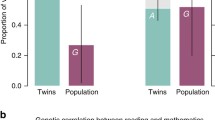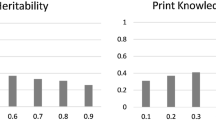Abstract
In order to assess the genetic etiology of the comorbidity of reading and mathematics difficulties, data were ascertained from two samples: (1) 102 identical and 77 same-sex fraternal twin pairs in which at least one member of each pair is reading disabled and (2) 42 identical and 23 same-sex fraternal twin pairs in which at least one member is math disabled. Composite reading and mathematics performance data from each sample were fitted to the basic multiple regression model for the analysis of selected twin data and its bivariate extension. Resulting estimates of bivariate heritability and the genetic correlation between the reading and the mathematics performance measures suggest that the comorbidity between mathematics and reading difficulties is due in part to genetic influences.
Similar content being viewed by others
REFERENCES
Alarcón, M., DeFries, J. C., Light, J. G., & Pennington, B. F. (in press). A twin study of mathematics disability. J. Learn. Disabil.
Badian, N. (1983). Dyscalculia and nonverbal disorders of learning. In Myklebust, H. (ed.), Progress in Learning Disabilities, Stratton, New York, pp. 235–264.
DeFries, J. C., and Alarcón, M. (1996). Genetics of specific reading disability. Ment. Retard. Dev. Disabil. Res. Rev., 2: 39–47.
DeFries, J. C., Filipek, P. A., Fulker, D. W., Olson, R. K., Pennington, B. F., Smith, S. D., and Wise, B. W. (1997). Colorado learning disabilities research center. Learn. Disabil. Multidisc. J. 8:7–19.
DeFries, J. C., and Fulker, D. W. (1985). Multiple regression analysis of twin data. Behav. Genet. 16:467–473.
DeFries, J. C., and Fulker, D. W. (1986). Multivariate behavioral genetics: An overview. Behav. Genet. 16:1–10.
DeFries, J. C., and Fulker, D. W. (1988). Multiple regression analysis of twin data: Etiology of deviant scores versus individual differences. Acta Genet. Med. Gemellol. 37:205–216.
DeFries, J. C., Olson, R. K., Pennington, B. F., and Smith, S. D. (1991). Colorado reading project: Past, present, and future. Learn. Disabil. 2:37–46.
Dunn, L. M., and Markwardt, F. C. (1970). Examiner's Manual: Peabody Individual Achievement Test, American Guidance Service, Circle Pines, MN.
Geary, D. C. (1993). Mathematical disabilities: Cognitive, neuropsychological, and genetic components. Psychol. Bull. 114:345–362.
Gillis, J. J., and DeFries, J. C. (1991). Confirmatory factor analysis of reading and mathematics performance measures in the Colorado Reading Project. Behav. Genet. 21:572–573.
Hazel, L. N. (1943). The genetic basis for constructing selection indexes. Genetics 28:476–490.
Jastak, S., and Wilkinson, G. S. (1984). The Wide Range Achievement Test—Revised—Administration Manual, Jastak Associates, Wilmington, DE.
Kosc, L. (1974). Developmental dyscalculia. J. Learn. Disabil. 7:164–177.
Light, J. G., and DeFries, J. C. (1995). Comorbidity of reading and mathematics disabilities: Genetic and environmental etiologies. J. Learn. Disabil. 28(2):96–106.
Muth, K. D. (1984). Solving arithmetic word problems: Role of reading and computational skills. J. Educ. Pshychol. 76:205–210.
Nichols, R. C. and Bilbro, W. C. (1966). The diagnosis of twin zygosity. Acta Genet. Stat. Med. 16:265–275.
Olson, R. K., Wise, B., Conners, F., Rack, J., and Fulker, D. W. (1989). Specific deficits in component reading and language skills: Genetic and environmental influences. J. Learn. Disabil. 22:339–348.
Rourke, B. P. (1993). Arithmetic disabilities, specific and otherwise: A neuropsychological perspective. J. Learn. Disabil. 26:214–226.
Siegel, L. S., and Linder, B. (1984). Short-term memory processes in children with reading and arithmetic learning disabilities. Dev. Psychol. 20:200–207.
Siegel, L. S., and Ryan, E. B. (1988). Development of grammatical-sensitivity, phonological, and short-term memory skills in normally achieving and learning disabled children. Dev. Psychol. 24:28–37.
Thompson, L. A., Detterman, D. K., and Plomin, R. (1991). Associations between cognitive abilities and scholastic achievement: Genetic overlap but environmental differences. Psychol. Sci. 2:158–165.
Wechsler, D. (1974). Examiner's Manual: Wechsler Intelligence Scale for Children—Revised, Psychological Corporation, New York.
Wechsler, D. (1981). Examiner's Manual: Wechsler Adult Intelligence Scale—Revised, Psychological Corporation, New York.
Author information
Authors and Affiliations
Corresponding author
Rights and permissions
About this article
Cite this article
Knopik, V.S., Alarcón, M. & DeFries, J.C. Comorbidity of Mathematics and Reading Deficits: Evidence for a Genetic Etiology. Behav Genet 27, 447–453 (1997). https://doi.org/10.1023/A:1025622400239
Issue Date:
DOI: https://doi.org/10.1023/A:1025622400239




